Retirees’ Confidence in the Economy Takes a Big Drop
With 69 straight months of job growth, unemployment at a seven-year low, the Dow Jones Industrial Average near all-time highs and the Federal Reserve confident enough to hike interest rates, you might think a sturdy U.S. economy has given everyone reason to cheer.
Apparently not everybody. New data from Wells Fargo indicates that something is spooking a sector of the U.S. population – the nation’s seniors – in a serious way.
On its Investor and Retirement Optimism Index, which tracks investor sentiment, retiree optimism dropped 23 points in a single quarter.
“It was a very big drop, and the first time in over a year that retirees were less optimistic than non-retirees,” says Zar Toolan, director of advice quality for Wells Fargo Advisors.
Over the same three months, non-retiree investor confidence actually went up by 10 points.
Michael Sokal, a 70-year-old retired teacher in Worcester, Massachusetts, is among the worriers.
“Our portfolio isn’t what it was when we first retired,” Sokal says. “We have been drawing it down, and the performance isn’t what we hoped for. It’s a big concern.”
When Wells Fargo analysts started digging a little deeper, they discovered a few different factors at work.
With the cash in their bank accounts earning virtually nothing, and the stock market essentially flat for the year, retirees have not been seeing any portfolio improvements. Inflation, a notorious portfolio-killer, looms whenever an economy is heating up.
Meanwhile, living expenses are lofty. Healthcare costs in retirement for a 65-year-old couple now stands at an estimated $245,000, according to Fidelity Benefits Consulting.
What really drives the point home for retirees is that they have a shorter investment horizon than those still in the prime of their careers. An investor at age 70 or 75 cares very much about shorter-term portfolio gains.
As a result, financial planners report having do an increasing amount of hand-holding with their senior clients.
“They worry about ISIS, rising interest rates, income disparity, European recession, dysfunctional Congress, slowdown in China, and falling commodity prices,” says Austin Frye, a financial planner in Aventura, Florida. “There is, in fact, a lot for them to worry about.”
Financial advisers says seniors need take a deep breath, reassess where they are at, and not make any rash portfolio decisions.
Most of all, excessive worry indicates that you may not be as risk-tolerant as you thought, suggests Wells Fargo’s Toolan.
If you come to that conclusion, it is perfectly reasonable to revisit your asset allocation, particularly if you have not done so in a few years.
Wells Fargo has a quiz to that effect (http://bit.ly/1rmlGWT), which can design a portfolio that will help turn down that worry dial.
Even if you are not fretting excessively, it is possible your allocation has become out-of-whack in favor of higher-risk equities after such a lengthy bull market. Shifting a percentage into fixed income will not only steady your portfolio’s volatility, but will help you sleep better at night.
After all, the 2015 stock market was not that bad, says Frye, the financial planner.
As for Michael Sokal, he has been slowly shifting his portfolio towards a more moderate risk profile, and has eased back on things like travel expenses.
Still, that hasn’t taken the edge off the dread he feels about the economic challenges on the horizon.
“One retiree friend of mine canceled a trip he had been looking forward to for a long time, and another decided to just keep working for years to come,” says Sokal.
“Our financial adviser once told my wife and I that at least one of us should plan on living to 100 – and that really struck home.”
© 2015 Thomson Reuters. All rights reserved.
















































